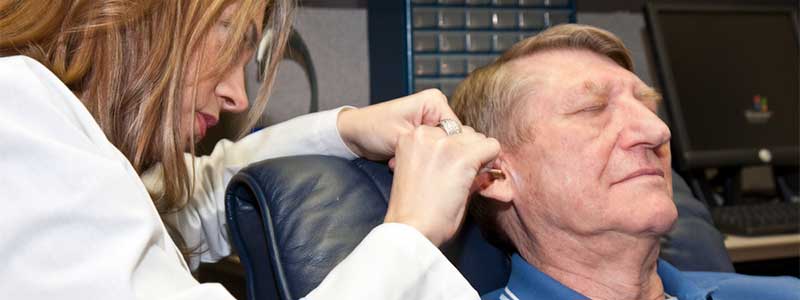How’s Your Balance?
Dizziness is among the top three reasons adults visit their doctors. Nearly 36% of adults over the age of 40 suffer from chronic dizziness, vertigo, or loss of balance. About 30% of adults over the age of 60 suffer from chronic dizziness. Inner ear dysfunction is a leading cause of dizziness and vertigo. At Bridgewater, we provide comprehensive vestibular testing to determine if dizziness or balance issues are present due to vestibular pathology.

Electrocochleography (EcochG): Test for Meniere’s disease.
Vestibular Evoked Myogenic Potential (VEMP): Assists the physician in determining if there is dysfunction of the saccule or inferior vestibular nerve.
Videonystagmography Testing (VNG): Assists the physician in determining if the patient’s dizziness is caused by inner ear dysfunction, BPPV, or central pathology.
Auditory Brainstem Response (ABR): Identifies abnormalities of the auditory neural pathways through the level of the brainstem such as an acoustic neuroma. We also utilize ABR to determine hearing levels in infants and difficult to test patients.
The electrocochleography test is an objective measure of the electrical potentials generated in the inner ear as a result of sound stimulation. This test is often used to determine if there is an excessive amount of fluid pressure in the inner ear (cochlea). Excessive fluid pressure in the cochlea can cause symptoms such as hearing loss, aural fullness, dizziness, or tinnitus. These symptoms are sometimes indicative of certain pathologies such as Meniere’s disease or endolymphatic hydrops.
The EcochG takes up to one hour to complete. A patient undergoing an EcochG test will have surface electrodes placed on their head. A tiny microphone and an earphone will then be inserted into the ear canals. The patient will be instructed to relax while they listen to a clicking sound. It is very important that the patient be relaxed for this test since any tension or muscle movement can slow down the averaging process. No response from the patient is required for this test. While the patient is listening to the clicking, the audiologist will measure the EcochG response with a computer that uses signal filtering and averaging to isolate neural activity from the cochlea.
Our audiologists will collect several responses from the ear and will look for the presence of a large waveform, which contains two components: the summating potential (SP) and the action potential (AP). Both of these waveform components are direct results of providing sound stimulation to the cochlea. A calculation of the SP/AP ratio is made. An increased SP/AP ratio can indicate excessive fluid pressure in the ear.
This procedure is not influenced by medication. Please take your medicine as prescribed by your doctor. Test results will be sent to your doctor and they will review the findings.
Please feel free to call our office if you have any questions.
The VEMP test measures a response from the inner ear that is generated by a sound. It is used in balance testing to evaluate saccule function and the integrity of the inferior vestibular nerve. A VEMP recording does not require that the patient have measurable hearing.
What symptoms indicate VEMP testing?
- Imbalance
- Dizziness
- Bouncing vision
- Dizziness to loud sounds
- Sound or pressure induced eye movements
- Sudden sensorineural hearing loss
How is the test performed?
The patient is seated comfortably and surface electrodes are taped on the sternum and the neck muscles. The patient turns their head to contract the neck muscles. A loud tone is presented to the ear of the neck muscle being activated. The response is recorded and analyzed. The evaluation typically is completed in thirty minutes.
Medication does not affect the VEMP response. Please continue to take your medication.
Please do not hesitate to contact Bridgewater at any time if you have questions or concerns at (865) 769-0283. We look forward to meeting you!

